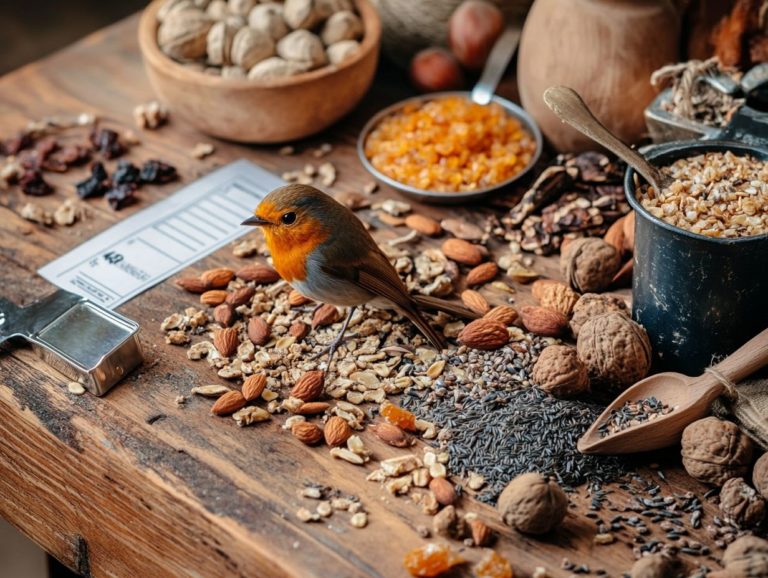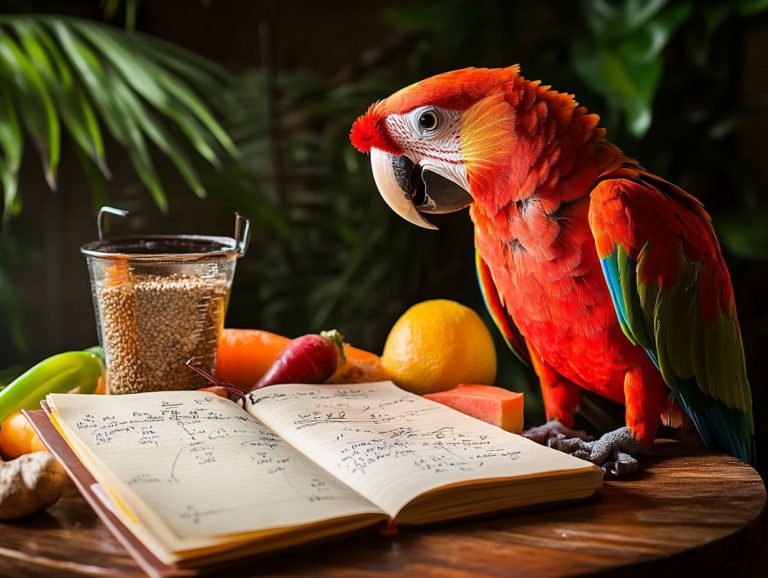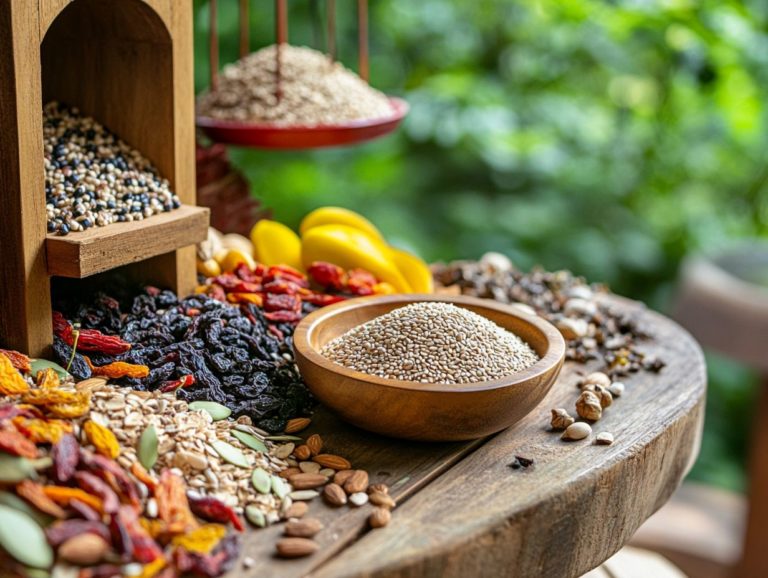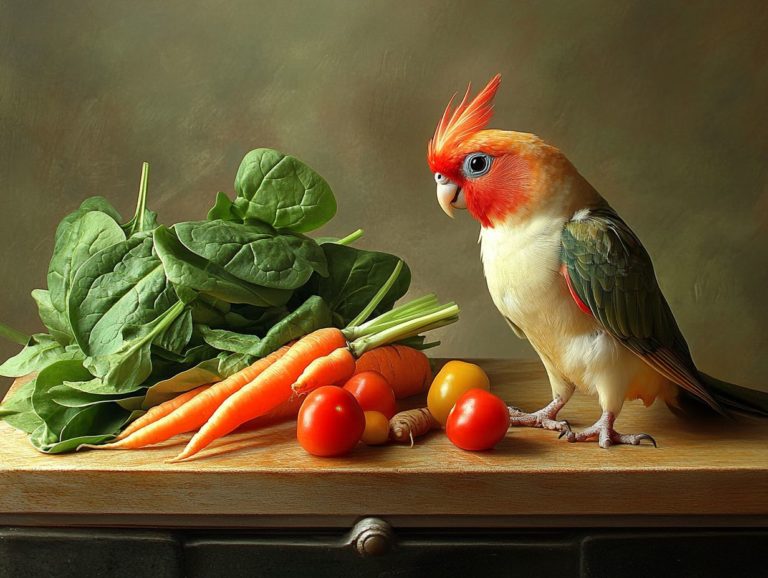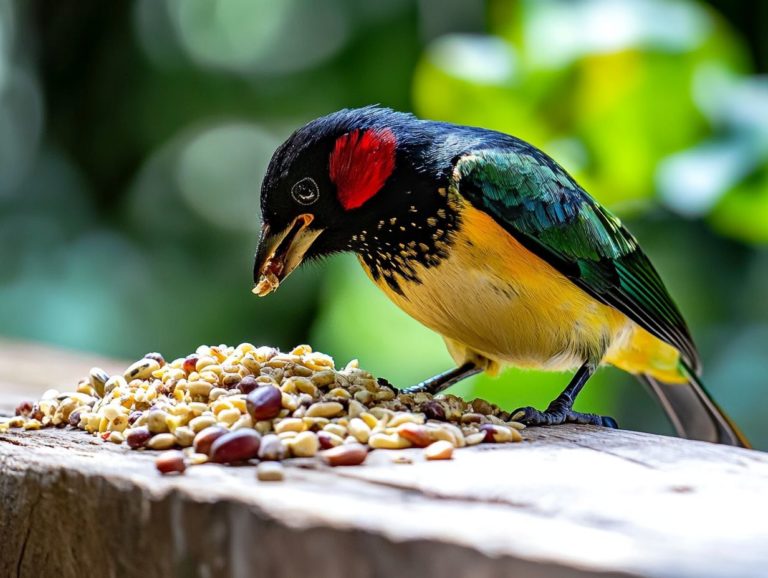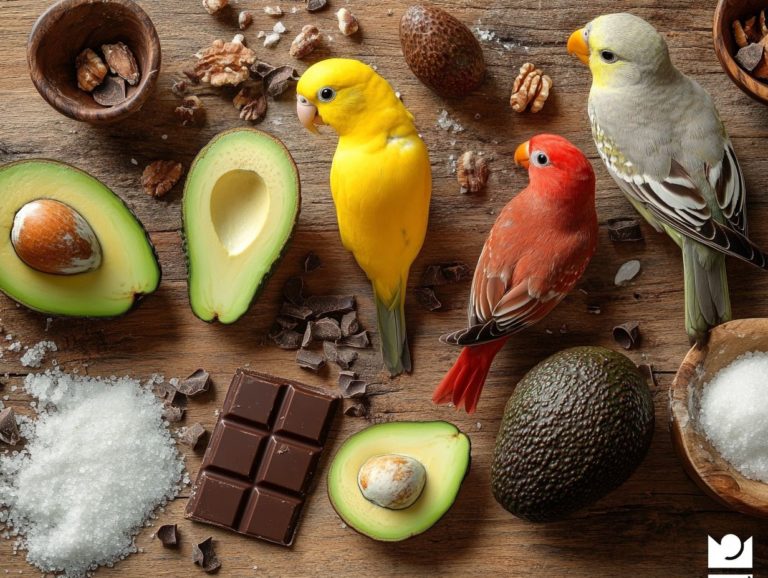5 Nutritional Myths About Birds
Understanding what your feathered friends need to thrive can be quite the challenge, especially with so many myths circulating about their diets. Get ready to uncover five common myths about bird diets!
This article debunks misconceptions about bird nutrition from the belief that they can survive solely on seeds and grains to the idea that they don t need water. You’ll explore the varied diets of different bird species, the importance of fruits and vegetables, and how nutrition impacts their health and behavior.
Dive in as we clarify these myths and provide practical tips for ensuring your bird receives a balanced diet.
Contents
Key Takeaways:
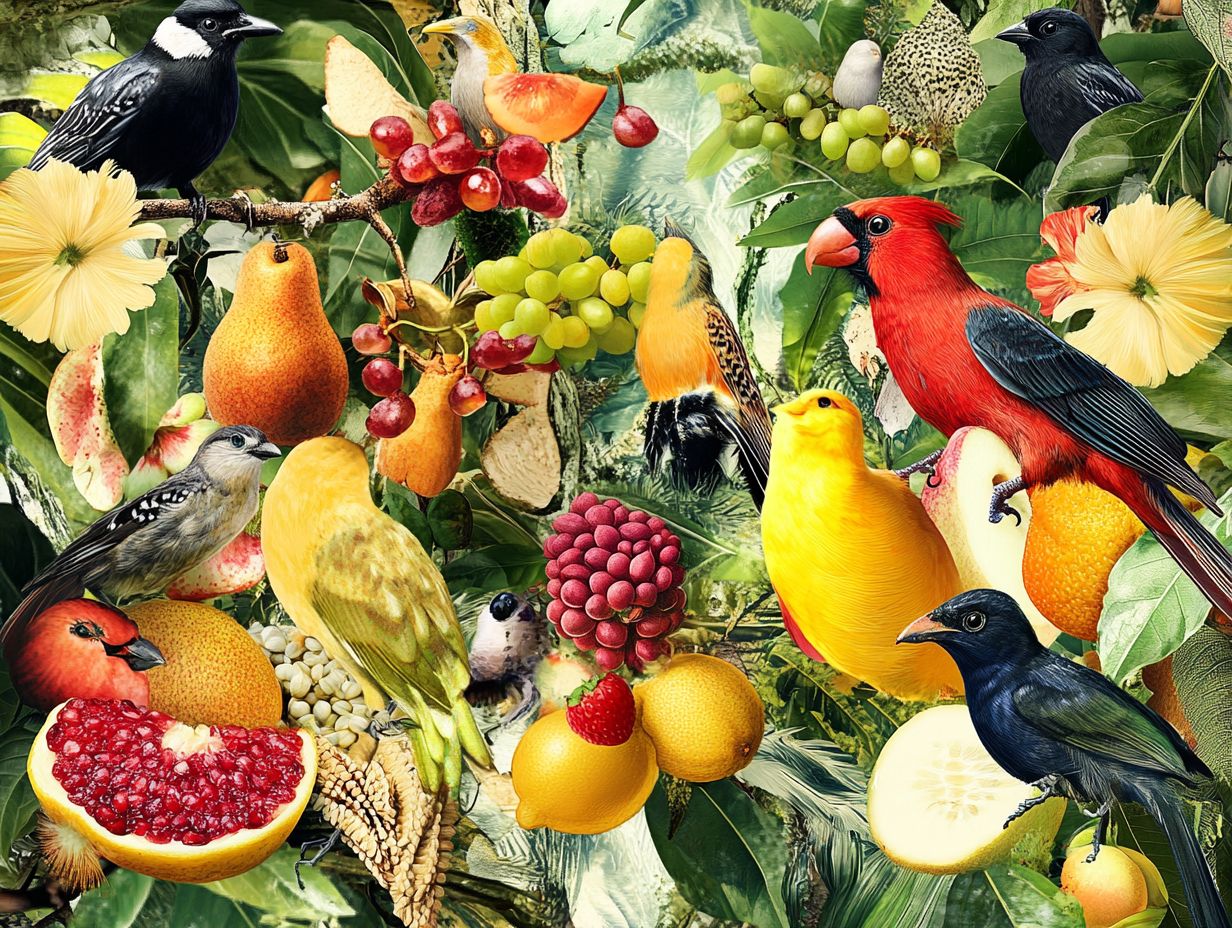
- Not all birds can survive on just seeds and grains; a varied diet is essential for their nutritional needs.
- Different types of birds have unique dietary requirements, and not all birds can eat the same types of food.
- Birds need fruits and vegetables, which should be included as part of a balanced diet.
1. Birds Only Need Seeds and Grains to Survive
Many bird owners think that wild birds can thrive solely on seeds and grains. However, these foods alone do not provide complete nutrition essential for their health, especially during migration and winter feeding.
A well-rounded bird diet encompasses various natural foods, including sunflower seeds and mixed seed blends tailored to the unique needs of different bird species.
Wild birds need a mix of protein, fats, vitamins, and minerals from diverse food options. For example, insects provide crucial protein necessary for nesting birds, while fruits and berries supply vital vitamins and hydration.
Specific dietary needs can vary. Seed-eating birds like finches may thrive on a seed-heavy diet, but insectivores, such as warblers, rely heavily on insect larvae for growth and energy.
By understanding these varied feeding habits, bird enthusiasts can better support their feathered visitors, ensuring they have access to a balanced diet that promotes overall health and well-being.
2. All Birds Can Eat the Same Foods
Not every bird can feast on the same menu; each species has unique dietary requirements that you, as a bird owner, must understand to ensure their health and well-being.
Take the American Goldfinch, for example. This delightful bird thrives on a diet rich in seeds, particularly those from native plants like sunflowers and thistles. On the flip side, the ruby-throated hummingbird has a completely different diet, primarily relying on nectar from flowers and supplementing it with insects for that essential protein boost.
Wildlife experts suggest curating a specialized seed mix for your finches and ensuring your hummingbirds have access to a sugar-water solution that closely mimics their natural food source. It s also vital to maintain cleanliness and freshness at your feeding stations.
By following these specific guidelines, you not only support healthy bird populations but also attract a delightful variety of species to your feeders.
3. Birds Can’t Eat Fruits or Vegetables
The belief that birds can t eat fruits or vegetables is misleading. Many bird species thrive on these natural foods, though caution is necessary, as some, like avocados, can be harmful.
Incorporating fruits and vegetables into their diet can be a game-changer, providing essential vitamins and minerals that enhance overall health and vitality. For example, leafy greens like kale and spinach are excellent sources of calcium and iron, while berries such as blueberries and strawberries are packed with antioxidants that boost the immune system.
However, it s vital to research which foods are safe. Some fruits like cherries and apples should be offered without their seeds due to potential toxicity. By understanding these risks, you can ensure that your feathered companions enjoy a balanced diet, promoting better health and longevity.
Start diversifying your bird s diet today for a healthier, happier feathered friend!
4. Birds Don’t Need Water to Drink
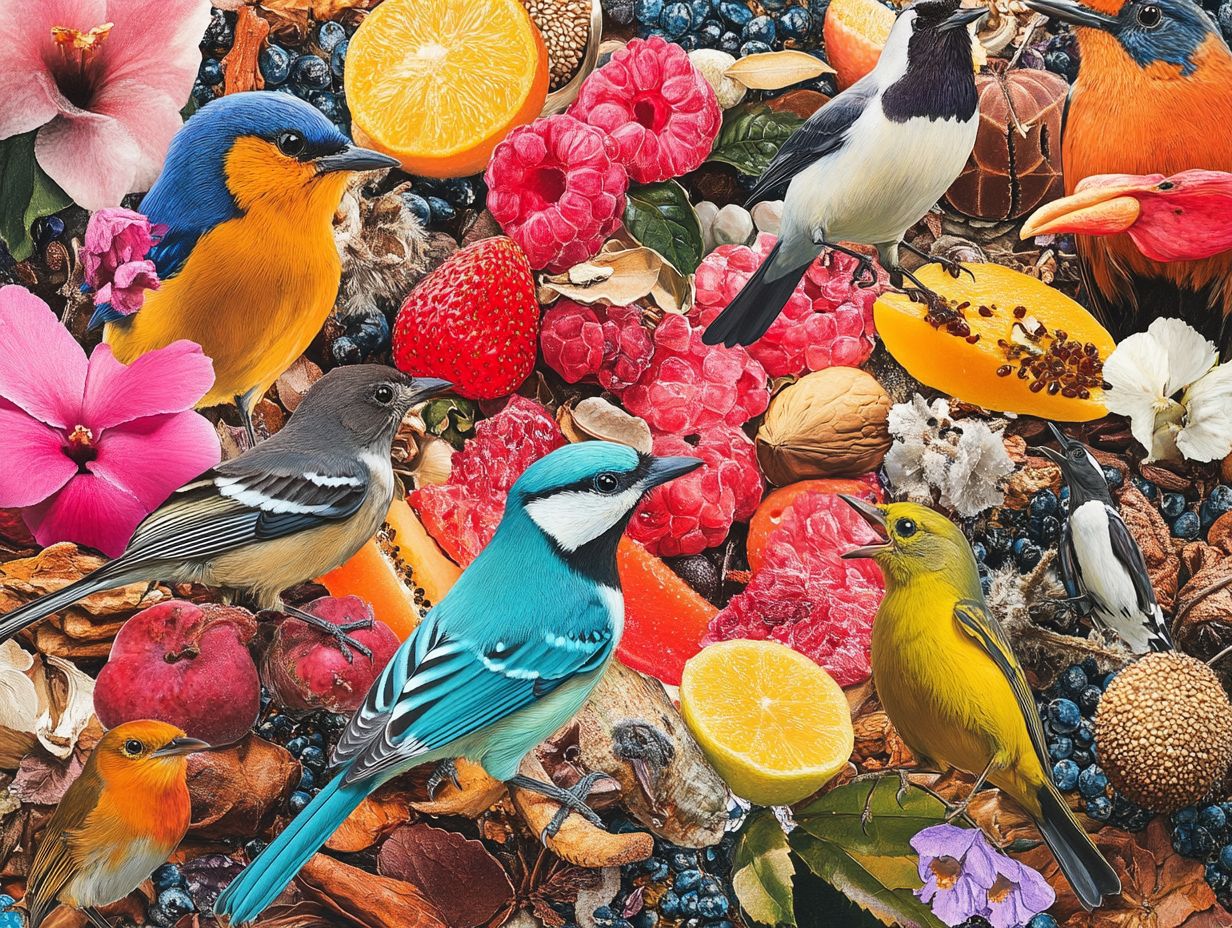
Many bird owners may think their feathered friends don t need water for hydration. However, access to clean drinking water is vital for the health and well-being of both wild and pet birds. Birds need fresh water, especially during hot summer days and cold winter nights!
By providing a reliable source of fresh water, such as a birdbath or dedicated water feeder, you can significantly prevent dehydration and keep the birds vibrant and healthy. Hydration is crucial not just for meeting daily energy needs but also for aiding proper digestion and feather maintenance.
Maintaining a regular cleaning routine for these water sources is just as essential. This helps eliminate harmful bacteria and algae from building up. By washing and refilling the water containers consistently, you create a safe environment that encourages these beautiful creatures to drink and thrive, ultimately enhancing their overall quality of life.
5. Birds Can’t Be Overweight or Obese
It’s a widespread myth that birds are immune to being overweight or obese. In reality, poor feeding practices and reliance on high-calorie foods can lead to serious health issues, such as fatty liver disease (a condition where fat builds up in the liver) and hardening of the arteries. As a responsible bird owner, it’s crucial to monitor their nutrition closely.
Many pet owners unknowingly exacerbate this issue by offering diets rich in seeds, nuts, or processed foods, which often lack the necessary variety and essential nutrients. To ensure your feathered companion thrives, a balanced avian diet should incorporate high-protein sources like legumes and lean meats, complemented by fresh fruits and vegetables that provide vital vitamins and minerals.
Effective feeding techniques, such as portion control and presenting food in diverse ways, can foster healthier eating habits. Incorporating forage feeding stimulates natural foraging behaviors, encouraging your birds to be more active and engaged while broadening their nutrient intake.
What Are the Nutritional Needs of Birds?
Understanding the nutritional needs of birds is essential for their overall health and well-being. These needs can vary greatly among different bird species, and addressing them is crucial to preventing vitamin deficiencies and other health risks that can arise from improper feeding practices.
A balanced diet is key, incorporating vital nutrients such as proteins, which support growth and tissue repair, as well as fats that provide energy and promote cellular health. Vitamins and minerals also play critical roles in various metabolic processes, ensuring feathers remain vibrant and immune systems stay robust. To meet these nutritional requirements, dietary supplements extra nutrients that help fill gaps in a bird’s diet can be invaluable.
For example, while some species thrive on a seed-based diet, others may require fruits, insects, or specialized pellets to effectively meet their unique nutritional demands.
What Types of Foods Are Best for Different Types of Birds?
Different types of birds thrive on specific foods that cater to their unique dietary needs. It’s essential for you to understand which food sources best support the health of both backyard and wild birds.
By recognizing the preferences of various species, you can offer a varied diet that includes seeds, fruits, and specialized bird food. For instance, seed-eating species like finches and sparrows thrive on a rich assortment of sunflower seeds and millet, while fruit-loving birds, such as the American robin, are irresistibly drawn to berries and other fresh produce. Supplementing these diets with specialized blends boosts their nutritional intake and mimics their natural foraging behaviors.
By adhering to feeding guidelines, you ensure that the birds receive a balanced diet, promoting their overall vigor and longevity. Plus, you ll attract a delightful diversity of feathered friends to your backyard, turning it into a lively avian haven.
Get started today on creating your avian haven!
How Can a Bird Owner Ensure Their Bird Is Getting Proper Nutrition?
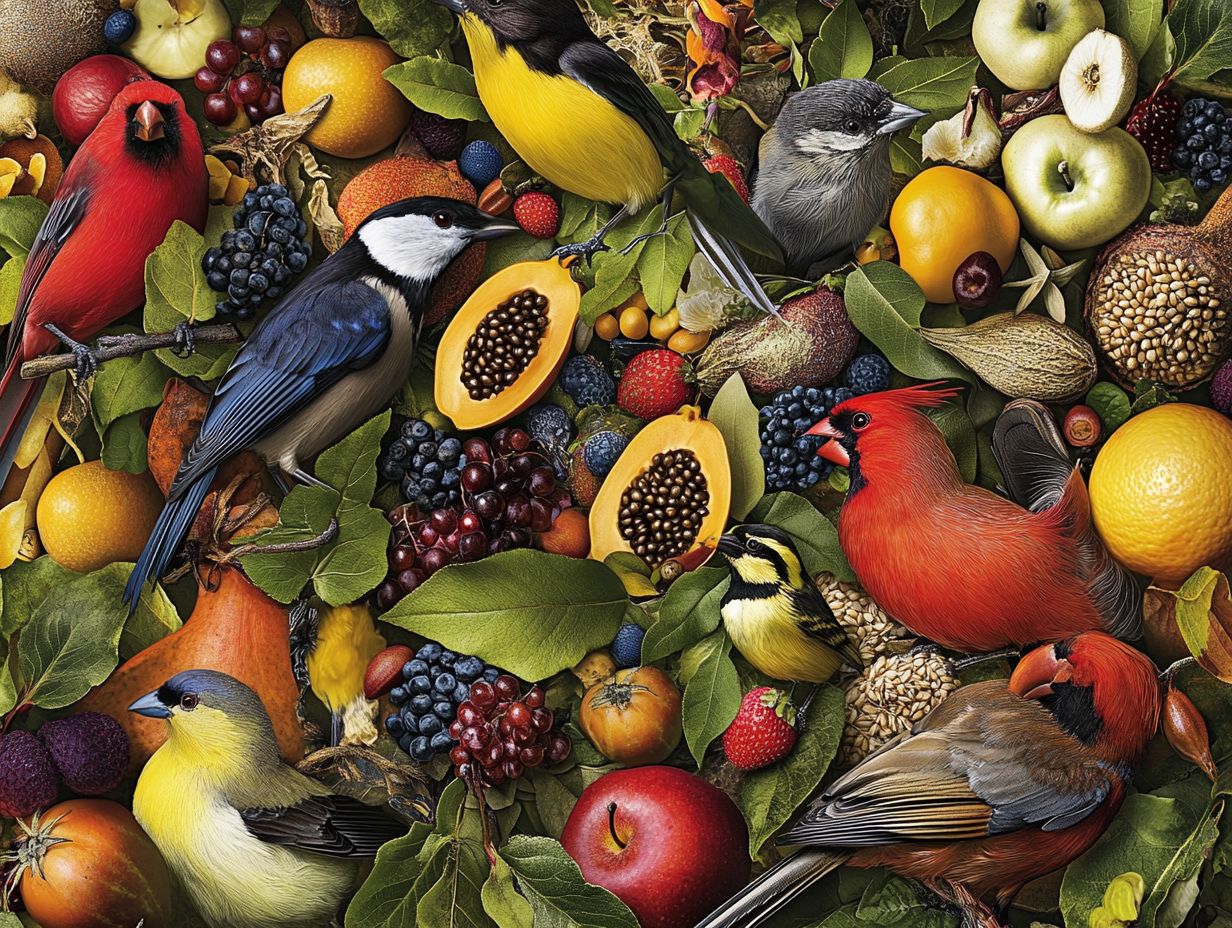
For bird owners, ensuring that your feathered friends receive proper nutrition means understanding the type of food birds need to stay healthy, using effective feeding techniques, and being aware of potential health risks from an incomplete diet, including the impact of indoor cats on wild birds.
Start by choosing high-quality pellets specifically formulated for your bird’s species. This provides a solid foundation for their diet. You can also add a variety of fresh fruits and vegetables to enhance flavor and deliver essential vitamins and minerals.
You can integrate dietary supplements such as omega-3 fatty acids or probiotics to further boost their health.
Be vigilant about signs of nutritional deficiencies like feather plucking or lethargy which may indicate your bird isn t getting balanced nutrition. Regular consultations with an avian veterinarian can help ensure that your dietary choices are appropriate and effective, keeping your feathered companion in top shape.
What Are the Dangers of Feeding Birds the Wrong Foods?
Feeding birds the wrong foods can lead to serious health risks, so be careful with what you offer them! Harmful substances like avocado and salmonella can have dire consequences for their well-being.
You might be surprised that chocolate, a beloved treat for humans, can cause severe complications in birds, including heart problems or even death. Additionally, many people mistakenly believe that bread is a healthy food option for birds. In reality, it lacks the essential nutrients they require and can lead to malnutrition.
To ensure a balanced diet, make sure to provide:
- Seeds
- Legumes
- Vegetables
Also, steer clear of sugary snacks and processed foods. By understanding these dietary needs, you can significantly enhance their health and longevity.
How Can a Bird’s Diet Affect Their Behavior and Health?
A bird’s diet is crucial to its behavior and overall health. If nutrition falls short, you may notice behavioral issues and physical ailments, which highlights the importance of a balanced feeding regimen.
Consider the variety of food sources available seeds, fruits, and insects each offering unique nutritional benefits that directly influence activity levels and social interactions among birds. For example, a protein-rich diet can boost energy, encouraging more active play and exploration.
Conversely, a lack of essential vitamins can lead to lethargy and withdrawal from socializing. Relying too heavily on one type of food can create dependency, potentially leading to deficiencies that compromise both health and behavior.
Therefore, providing a diverse diet is essential for promoting optimal behavior and nurturing healthier social dynamics among birds.
What Are Some Common Misconceptions About Feeding Birds?
Despite the abundance of information available, many bird owners cling to misconceptions about feeding their feathered friends, which can lead to unhealthy practices. To ensure proper nutrition, consider these 5 quick tips for feeding your bird that promote their health.
One common myth is the belief that all birds can thrive on the same types of seeds, ignoring the unique dietary needs of different species. Wildlife experts stress that a varied diet is essential; some birds need fruits and vegetables alongside seeds to truly flourish, as highlighted in a comprehensive guide to bird nutrition.
Another misconception is that feeding birds bread is harmless, but this can actually harm their digestive systems. Experts recommend offering options like specialized pellets and fresh foods tailored to each species.
By debunking these myths and embracing a deeper understanding of proper bird nutrition, you can avoid common dietary mistakes bird owners make and establish sustainable and ethical feeding habits that genuinely benefit your avian companions.
Frequently Asked Questions
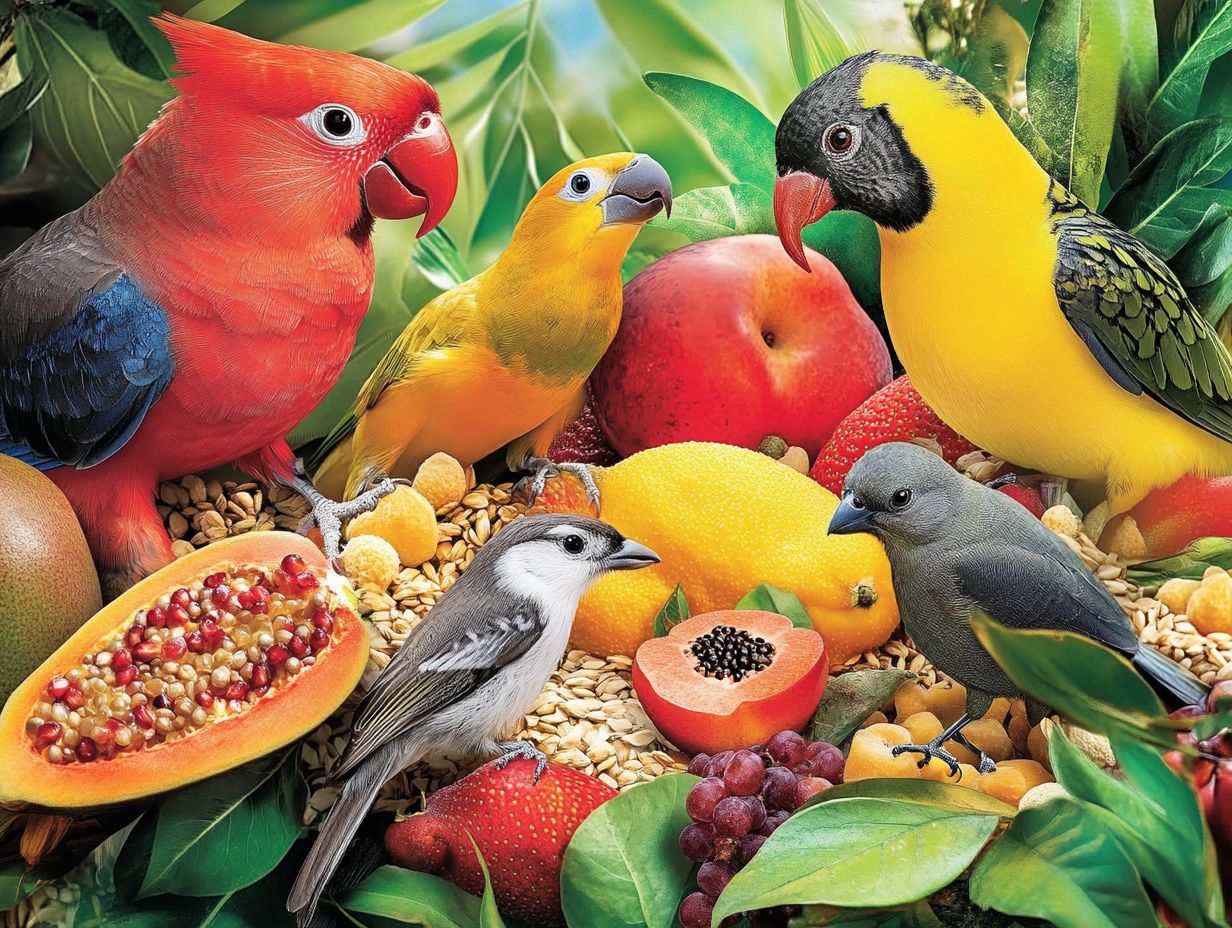
Q: What should I avoid feeding my bird?
A: Avoid foods like chocolate, avocado, and bread. These can cause serious health issues for your pet.
Implement the tips provided above to ensure your feathered friends live a healthy and happy life. Check back for more information on bird care!
What are the top 5 nutritional myths about birds?
Many people believe birds only need seeds. Others think birds can eat any human food, or that they can t enjoy fruits and vegetables.
Birds actually need a varied diet to stay healthy.
Is it true that birds only need seeds in their diet?
No, this is a common misconception. While seeds can be part of a bird’s diet, they do not provide all the necessary nutrients for a healthy bird. A varied and balanced diet is essential.
Can birds eat any human food?
No, not all human food is safe for birds. Some can be toxic or harmful. Always choose safe foods! Your bird’s health depends on it.
Can birds eat fruits and vegetables?
Absolutely! Fruits and vegetables are essential for their health.
These foods provide vital vitamins and minerals. Offer a colorful mix to keep your bird excited!
Do birds need to eat constantly?
No, birds do not need to eat constantly. In the wild, they have periods of feeding and resting. Keep your bird happy by sticking to a regular feeding schedule!
Is it true that birds don’t need a varied diet?
No, birds do need a varied diet. Like humans, they require different nutrients to stay healthy. A diet consisting of only one type of food can lead to a lack of nutrients and health problems.

